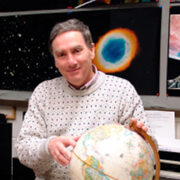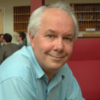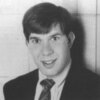Mario Livio
Author of The Golden Ratio: The Story of Phi, the World's Most Astonishing Number
About the Author
Mario Livio was born in 1945 in Romania. When he was 5 years old, he immigrated with his grandparents to Israel. He received undergraduate degrees in physics and mathematics from the Hebrew University in Jerusalem, a M.Sc. degree in theoretical particle physics at the Weizmann Institute, and a show more Ph.D. in theoretical astrophysics at Tel-Aviv University. He was a professor of physics at the Technion-Israel Institute of Technology from 1981 until 1991. He is a senior astrophysicist at the Hubble Space Telescope Science Institute. He has published over 400 scientific papers. He has also written several books including The Accelerating Universe, The Equation That Couldn't Be Solved, Is God a Mathematician?, and Brilliant Blunders: From Darwin to Einstein - Colossal Mistakes by Great Scientists That Changed Our Understanding of Life and the Universe. The Golden Ratio received the International Pythagoras Prize and the Peano Prize. (Bowker Author Biography) show less
Image credit: Mario Livio
Works by Mario Livio
The Golden Ratio: The Story of Phi, the World's Most Astonishing Number (2002) 2,392 copies, 23 reviews
The Equation That Couldn't Be Solved: How Mathematical Genius Discovered the Language of Symmetry (2005) 707 copies, 15 reviews
Brilliant Blunders: From Darwin to Einstein - Colossal Mistakes by Great Scientists That Changed Our Understanding of… (2013) 522 copies, 1 review
The Accelerating Universe: Infinite Expansion, the Cosmological Constant, and the Beauty of the Cosmos (2000) 91 copies, 1 review
Planets to Cosmology: Essential Science in the Final Years of the Hubble Space Telescope: Proceedings of the Space… (2006) 11 copies
Astrophysics of Life: Proceedings of the Space Telescope Science Institute Symposium, held in Baltimore, Maryland May… (2005) 10 copies
The Dark Universe: Matter, Energy and Gravity (Space Telescope Science Institute Symposium Series) (2003) 9 copies
A Decade of Hubble Space Telescope Science (Space Telescope Science Institute Symposium Series) (2012) 7 copies
A Decade of Extrasolar Planets around Normal Stars: Proceedings of the Space Telescope Science Institute Symposium,… (2008) 6 copies
A Decade of Hubble Space Telescope Science (Space Telescope Science Institute Symposium Series) (2003) 5 copies
Massive Stars: From Pop III and GRBs to the Milky Way (Space Telescope Science Institute Symposium Series) (2009) 3 copies
The Local Group as an Astrophysical Laboratory: Proceedings of the Space Telescope Science Institute Symposium, held in… (2006) 3 copies
Cataclysmic variables and related objects : proceedings of the 72nd Colloquium of the International Astronomical Union,… (2012) 2 copies
The Extragalactic Distance Scale (Space Telescope Science Institute Symposium Series) (1997) 2 copies
Cantonate 1 copy
Cataclysmic Variables and Related Objects: Proceedings of the 72nd Colloquium of the International Astronomical Union… (2011) 1 copy
Ist Gott ein Mathematiker? 1 copy
Associated Works
Tagged
Common Knowledge
- Birthdate
- 1945-06-19
- Gender
- male
- Nationality
- Israel
- Birthplace
- Bucharest, Romania
- Places of residence
- Romania (birth)
Tel Aviv, Israel - Education
- Hebrew University of Jerusalem (BS|physics and mathematics)
Weizmann Institute of Science (MS|theoretical particle physics)
Tel-Aviv University (Ph.D.|theoretical astrophysics) - Occupations
- astrophysicist
- Organizations
- Space Telescope Science Institute
Technion-Israel Institute of Technology
American Association for the Advancement of Science
Members
Reviews
Lists
Awards
You May Also Like
Associated Authors
Statistics
- Works
- 28
- Also by
- 2
- Members
- 4,503
- Popularity
- #5,566
- Rating
- 3.7
- Reviews
- 54
- ISBNs
- 160
- Languages
- 10





















The Publisher Says: An “intriguing and accessible” (Publishers Weekly) interpretation of the life of Galileo Galilei, one of history’s greatest and most fascinating scientists, that sheds new light on his discoveries and how he was challenged by science deniers. “We really need this story now, because we’re living through the next chapter of science denial” (Bill McKibben).
Galileo’s story may be more relevant today than ever before. At present, we face enormous crises—such as minimizing the dangers of climate change—because the science behind these threats is erroneously questioned or ignored. Galileo encountered this problem 400 years ago. His discoveries, based on careful observations and ingenious experiments, contradicted conventional wisdom and the teachings of the church at the time. Consequently, in a blatant assault on freedom of thought, his books were forbidden by church authorities.
Astrophysicist and bestselling author Mario Livio draws on his own scientific expertise and uses his “gifts as a great storyteller” (The Washington Post) to provide a “refreshing perspective” (Booklist) into how Galileo reached his bold new conclusions about the cosmos and the laws of nature. A freethinker who followed the evidence wherever it led him, Galileo was one of the most significant figures behind the scientific revolution. He believed that every educated person should know science as well as literature, and insisted on reaching the widest audience possible, publishing his books in Italian rather than Latin.
Galileo was put on trial with his life in the balance for refusing to renounce his scientific convictions. He remains a hero and inspiration to scientists and all of those who respect science—which, as Livio reminds us in this “admirably clear and concise” (The Times, London) book, remains threatened everyday.
I RECEIVED A DRC FROM THE PUBLISHER VIA NETGALLEY. THANK YOU.
My Review: A concise, well-thought-through biography of Galileo. The point of another biography of him is the present climate od science denial, of skepticism in our social and political realms, about the way science is done–and why it is done that way.
There is much to be taken from an erudite scientist and polymath's recounting of the events of Galileo's life in the specific context of looking at what led him to become a prisoner of conscience, what the men who opposed his dissemination of his discoveries were fighting for and against, and what this battle cost all of society. Author Livio is tendentious, unapologetically so, and presents a perfectly astonishing notes, footnotes, and sources collection for a popular not academic book.
The organization of the book is more thematic than linear. Following the author's arguments is, as expected from a scientist, not hard...being organized is kinda the job description of scientist, after all...but do not expect the chronology of Galileo's life to make an appearance, and go with the logical flow.
Science, being dedicated to the pursuit of facts, often presents its conclusions as Truth...then changes its mind as new evidence comes in. This is a feature, not a bug, in how science works. It conflicts with many people's intense need for Immutable Truth...science is pretty much antithetical to Immutability. This has the sad consquence of people like the church hierarchy is made up of, running head-on into people like Galileo and his fellow scientists as they follow the evidence and the facts in reaching very new conclusions...facts are not Truth. The conclusions based on the facts, new and old, are not Truth. Science is a worldview based on probabilities.
Many people feel this is shifty...dishonest...trying to put one over on them.
This is the conflict that Author Livio is arguing against. He does not use head-on confrontation to do so. Galileo's life, and his conflict with the hierarchy, does most of his heavy lifting. The beauty of his book is that this argument, presented in any other way, leads to deeper entrenchment of anti-science attitudes. By using the life of a well-known and respected scientist from the past, the attitudes that led him into conflict, and how that conflict is now understood, Author Livio uses the back door to find the chinks in the faulty logic used by science deniers.
Great book for your loud old uncle, or your argumentative teen boy, who has Opinions about science with no information to rest them on. Also good for you to read because you will learn more ways to build your counterarguments to the denials of facts to serve that evil illusion, Truth.… (more)